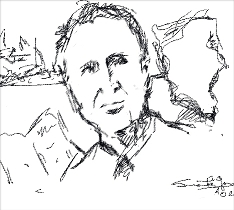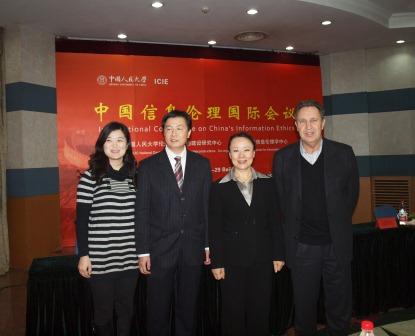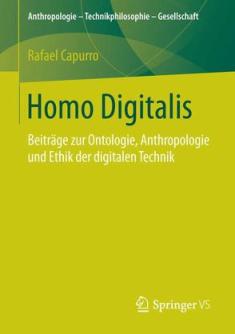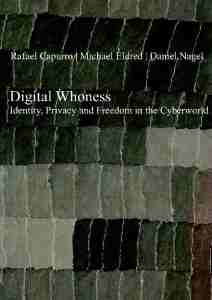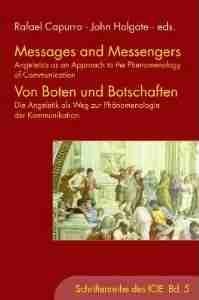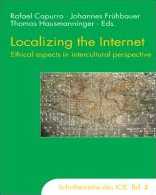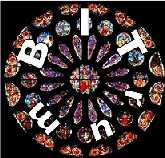|
Africa
English French German
Greek
Japanese
Persian
Portuguese
Spanish
INTERNET ARCHIVE: WAYBACK MACHINE 2001-2024 Curriculum
Vitae
Born 1945
in Academic Degrees, Awards and Professional Experience 学历及职业经历 See: Certificates Licentiate
in Philosophy
from Colegio
Máximo, Universidad del Salvador,
Lecturer at
the Institute
of Philosophy, Stuttgart University
(1987-2004). Academic
Advisor of the Institute
of Philosophy & Technology International
Society for Ethics and Information Technology

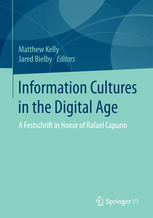 CAPURRO
FIEK
FOUNDATION
NEWS
IS4SI Summit 2023 Beijing 14-18 August 2023 Forum on Information Philosophy Aug. 14, 13.30 - 15.00 Chair: Kun Wu Venue: Rm 213, EM Building. Zoom ID: 948 6644 1538 Invited
Speakers
[01] Techno-social Systems – a Value-based Model for Digitalization Wolfgang Hofkirchner [02] On Middles and Thirds Joseph E. Brenner (on-line) [03] Methodology of Information Study Marcin J. Schroeder (on-line) [04] Take Your Time! -- Smart Systems in the Digital Age Rafael Capurro (on-line) [05] The Information Paradigm, Spanning All Levels of Human Knowledge Kun Wu [06] A Receptive Relation Understanding of Information Paradigm Change Tian’en Wang Take Your Time! Smart Living in the Digital Age Artificial
smart systems
"behaving as though
guided by intelligence" interact with natural
human and animal smart
intelligence. What makes the difference?
Firstly, natural smart
intelligence
arises from the being itself and concerns its
own goals. Artificial
smart
systems get their goals from the outside even if
they can further
develop it by
giving the impression "as though" they were
their own. Secondly,
their intelligence is based on stochastic
processes. Such processes are
random
as opposed to deterministic ones. The Greek word stochastikós is derived from stocházomai meaning aim at a target, from Greek stóchos aim. Artificial smart systems — or, better to say, their human designers let — calculate the best way to attain a goal given to them based on stochastic models that they can change as if they were learning not only by themselves but also for themselves as in the case of natural smart systems. They can do this quickly and shrewd as if they were making a conjecture about the best way to attain a goal as if it were their own goal. Hubert Dreyfus did foundational work on the difference between expert systems, the smart systems at that time, and human experts (Dreyfus 1972). His phenomenological and hermeneutic arguments are as fresh as they were fifty years ago. Ethics in
the age of smart
systems means to ask the
question of the relation between cunning
intelligence and moral
intelligence
called prudence (phronesis) by
Aristotle in the Nicomachean Ethics
(Aristotle
1962; Capurro 2020). Although Aristotle does not
use the term metis
he
uses
other similar terms such as skill (deinotes)
and cunning (panourgia).
Skill
is
praised in case the goals are good, otherwise it
is just cunning.
Prudence
(phronesis)
implies cunning
but not vice versa. Wickedness (mochtheria)
and
falsehood (diapseudesthai)
distort the judgement of reason (Aristotle,
NE 1143
b 23-36). Phronesis
mediates
between the knowledge of what is permanent
(sophia)
and the realm of
human action (ta
anthrophina)
particularly
regarding
the means to attain happiness (eudaimonia)
(Aristotle, NE 1143 b 20). The
reason why metis
is not
mentioned by Aristotle in his analysis of the
relation
between phronesis
and
cunning intelligence might be his taking a
critical
distance of mythical metis as
well as its use in human and non-human
contexts
blurring the differences. Aristotle acknowledges
that some animals have
the
capacity of previewing (dynamin
pronoetiken) but he does not agree with
"some people" who believe that "animals have
prudence
(phronima)."
(Aristotle, NE
1141 a 27). Detienne and Vernant remark
that
the link between human logos and
living beings without logos (aloga
zoia) might
become problematic if human phronesis interferes
with animal
intelligence
although he gives conjectural knowledge a
positive value in contrast to
Plato
who devalues knowledge based on probability as
contrary to the ethical
value of
temperance (sophrosyne).
For
Aristotle, sagacity (anchinoia)
implies a
certain
flexibility of the soul in contrast to the
quietness (hesuchia)
of
temperance (Detienne
and Vernant 1974, 304-306). The
Aristotelian analysis
of the relation between phronesis and
cunning
intelligence
provides a framework for dealing
with
today's ethical issues of smart systems that can
be compared, for
instance,
with the famous Chinese "Thirty-six stratagems"
as analyzed by Swiss
sinologist Harro von Senger (Senger 1993). Where,
for whom, to what
extent, and at what price do
smart systems make sense? What are the limits of
their use in private
and
political life? What is good as a possibility
for the community as a
whole and
what is good for me or for us? What should we
promote or forbid by law
and what
should we not? How can we initiate a lasting
(academic and daily)
critical
reflection on good living with smart systems? Immanuel
Kant wondered:
«Do we live in an enlightened
age?» (Kant, 1975, 59). Even if the answer was
no, he did think
it was an age
of enlightenment. Kant expected that when the
«the urge for and
the vocation of
free thought» had developed, it would gradually
impact not only
the population,
making citizens more capable of «acting in
freedom», but
also on «the
fundamentals of government», which would treat
humans, «who
is now more than a
machine, in accord with his dignity» (Kant,
1975, p. 61). What
better guidance
for thinking and acting in digital futures than
these words by Kant
published
in Königsberg on 30 September 1784? The dignity
of the human
person that
wonders «who am I?» is different to its
digitalisation,
which can change and
answers the question «what am I?» (Capurro,
2017b; Capurro,
Eldred, &
Nagel, 2013). Smart systems behave "as though
guided by
intelligence", that is to say, as if they were
guided by a 'who' while
in
fact it is just a reified one, or a 'what'. The
difference between who
and what is the basis of
ethical thinking particularly in the age of
smart systems. We must
learn the
vocation of free thinking outside
the
greenhorn field of algorithms guiding smart
systems (Seyfert &
Roberge,
2016), and to this end we must expand the
concept of digital enlightenment or digital literacy
(Limberg, Sundin, & Talja,
2012). This is because this concept is generally
understood as
education in the
use of digital technologies in general and smart
systems in particular
and not
as the task of reflecting upon individual and
collective life and
considering
sustainable digital futures. Do we
live in a smart age?
No, we live in
the age
of smart systems that looks sometimes as they
behaved as guided
by
intelligence
while being, in fact, stupid. The ethical
challenge is to envisage
smart living
within and beyond the stochastic horizon of
smart systems. To put it
shortly:
Take your time! Be smart in the age of smart
systems.
Aristotle
(1962). Ethica
Nicomachea. I. Bywater (Ed.). Oxford:
Clarendon
Press. Capurro,
R.,
Eldred, M., & Nagel, D. (2013). Digital
whoness. Identity,
privacy
and freedom in the cyberworld. Berlin:
De Gruyter. Capurro,
Rafael
(2020). Pseudangelia - Pseudangelos. On
false messages and
messengers in Ancient Greece.
In: Informatio 25(1), 2020,
106-131. Detienne,
Marcel,
Vernant, Jean-Pierre (1991). Cunning
intelligence in Greek culture and society. University of Chicago Press
(Engl. Transl. Janet
Lloyd. Orig. Les ruses de l'intelligence. La mètis
des Grecs,
Paris 1974). Dreyfus,
Hubert
L. (1972). What Computers Can't Do: the Limits of
Artificial
Intelligence. New York: MIT Press. Guzzoni, Ute (1999). Das
Philosophieren und
die List. In:
Harro von Senger (ed.): Die List. Frankfurt am Main:
Suhrkamp, 386-423. Kant, I. (1975). Beantwortung der
Frage: Was
ist Aufklärung?
In: Schriften zur Anthropologie,
Geschichtsphilosophie, Politik und
Pädagogik,
53–61. Darmstadt: Wissenschaftliche
Buchgesellschaft. Leibniz, G.W. (1996). Dialogus
(1677). In:
Schriften zur
Logik und zur philosophischen Grundlegung von
Mathematik und
Naturwissenschaft.
Frankfurt am Main: Suhrkamp, 23-37. Limberg, L., Sundin, O., &
Talja, S.
(2012). Three
theoretical perspectives on
information literacy. Human IT, 11(2),
93–130. Marx, K. (1969). Thesen über
Feuerbach. Marx-Engels
Werke, 3. Berlin: Dietz. Morozov,
E.
(2013). To save everything, click here: The
folly of technological
solutionism. New York: Public Affairs. Oxford
Learner's
Dictionaries Oxford
Etymology
Dictionary Seyfert,
R.,
& Roberge, J. (Eds.). (2016). Algorithmic
cultures: Essays
on
meaning, performance and new
technologies. London/New York:
Routledge. Senger,
Harro
von (1993). The Book of Stratagems: Tactics for
Triumph and
Survival.
London: Penguin Books. Senger,
Harro
von (Ed.) (1999a). Die List. Frankfurt am
Main: Suhrkamp. Zuboff, S. (2019). The age of surveillance
capitalism: The fight for a human
future at the
new frontier of power. New York: Public
Affairs. +++++++++++++++++++++++++++++  World
Education Day
Assembly-2019
Theme: Reshaping the Global Future of Education for All, Stream 17 Venue: Dalian International Conference Center, Dalian China 27-29. September, 2019. Presentation by Maximiliano Rodriguez Fleitas (Universidad de la República, Uruguay), See here supported by the Capurro Fiek Foundation VISITS TO CHINA March 26 - April 18, 1987 Invited
by the Chinese
Aeronautical Establishment (CAE), Beijing.
Lectures in German at CAE (Beijing) and Xi'an University of Technology on:
Chinese
translation of the
manuscript,
Beijing, PR of China, 1987.
Visit to:
Fu
HOST GIFT
On
the
upper-right corner, the characters read:
戊辰年 [孫荣科] 敬贈 the
year
in the Chinese
traditional astrology (but, it reads 1988),
Winter The
other
character on the right means: write
(calligraphically) MIRROR The
signs
at the back of the mirror
say: five
sons
achieve office/rank, which is a sign of virtue
of the family Top: Five VASE for painter's brushes BOWLS TAO TE CHING FIRST
INTERNATIONAL
CONFERENCE ON CHINA'S
INFORMATION ETHICS
organized
by the Renmin University of China,
School of Philosophy (Prof.
Li
Maosen) and
the International Center for Information
Ethics
Beijing, P.R. China October 28-29, 2010 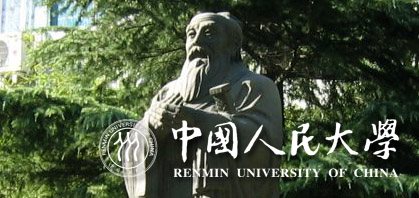 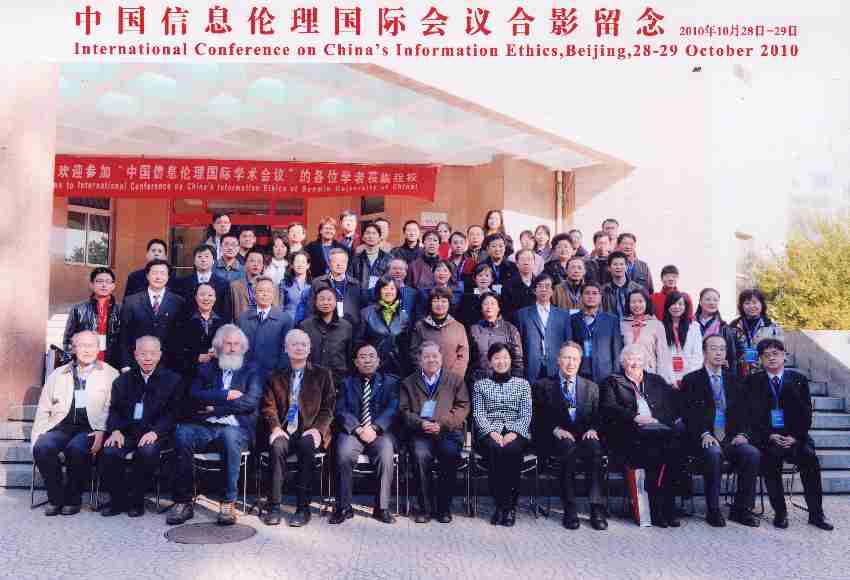 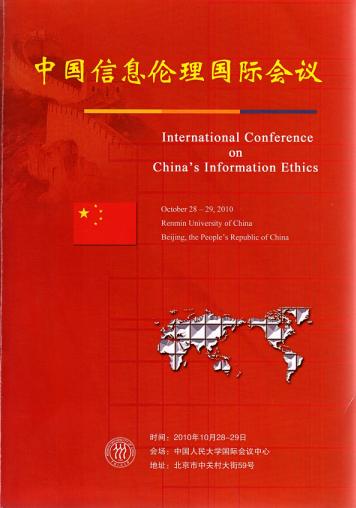 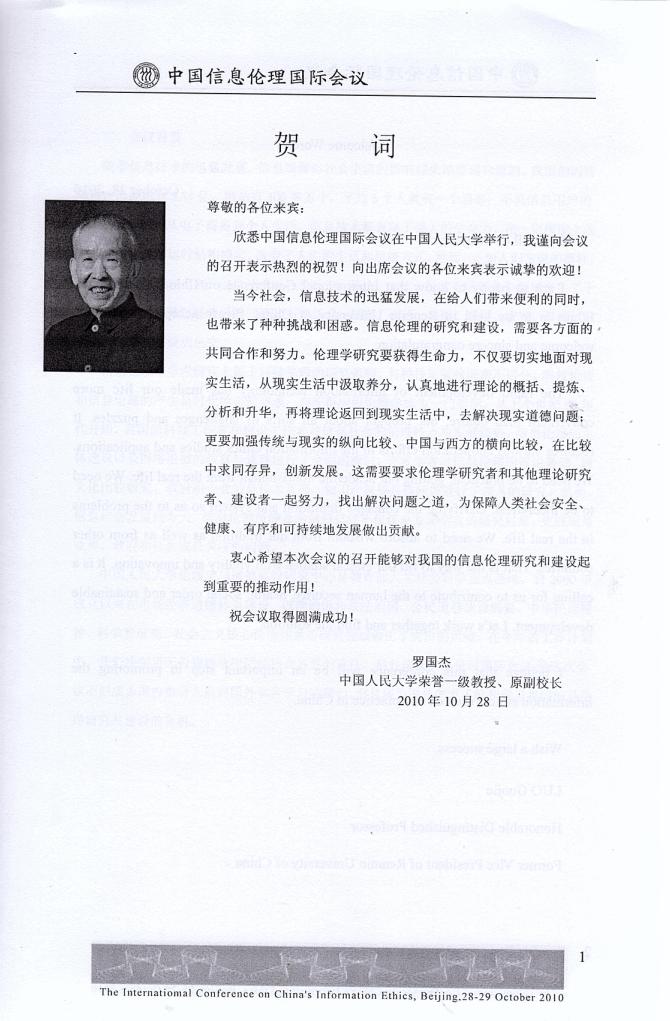 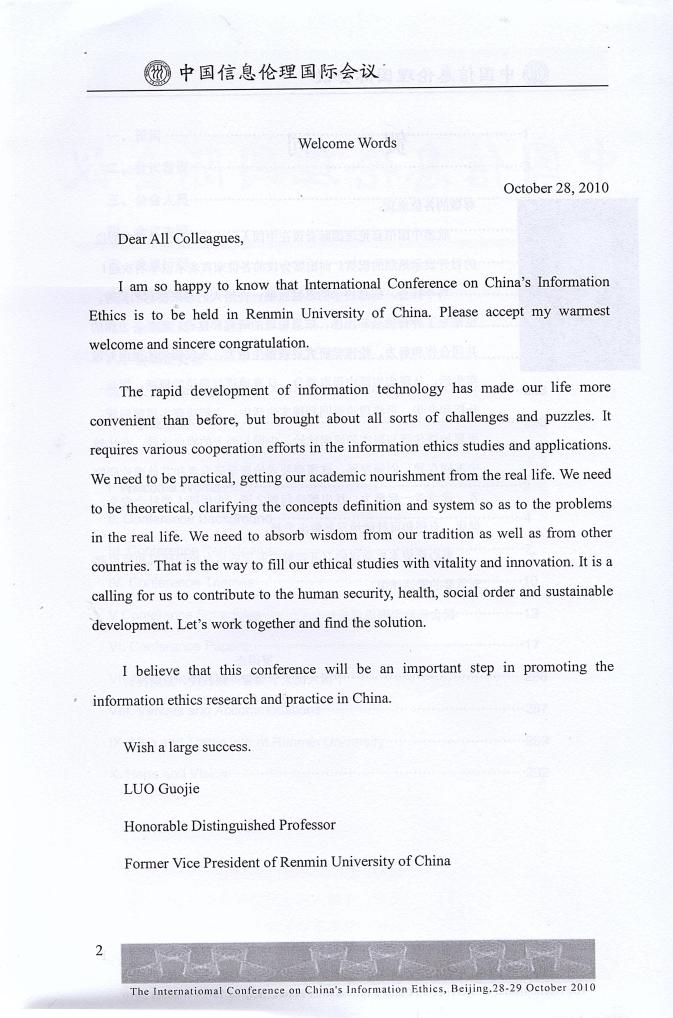 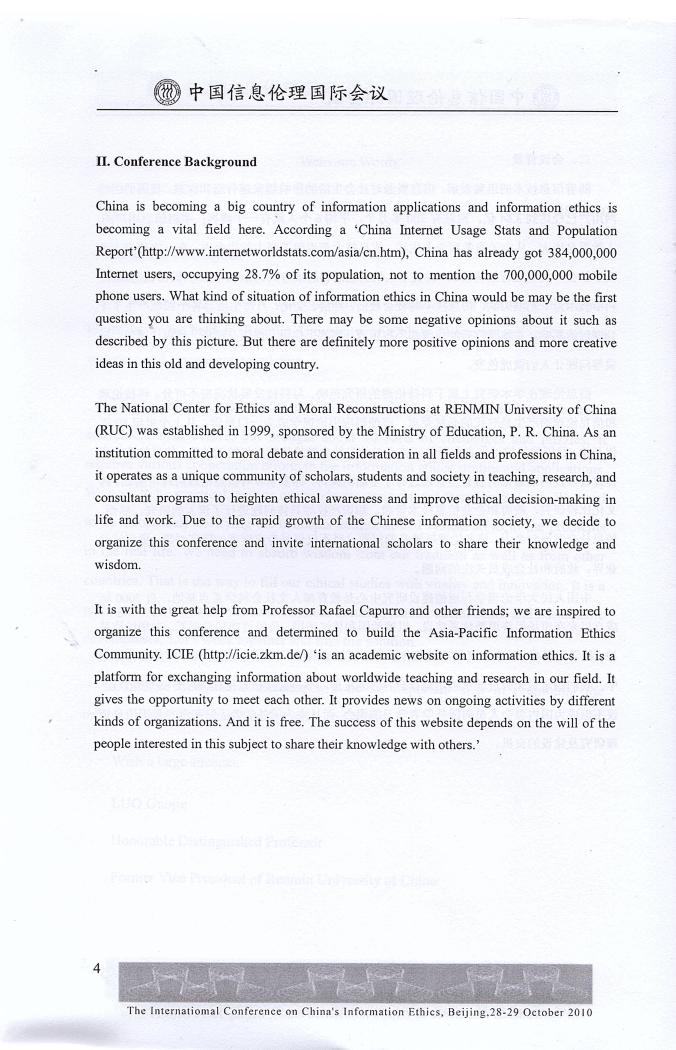 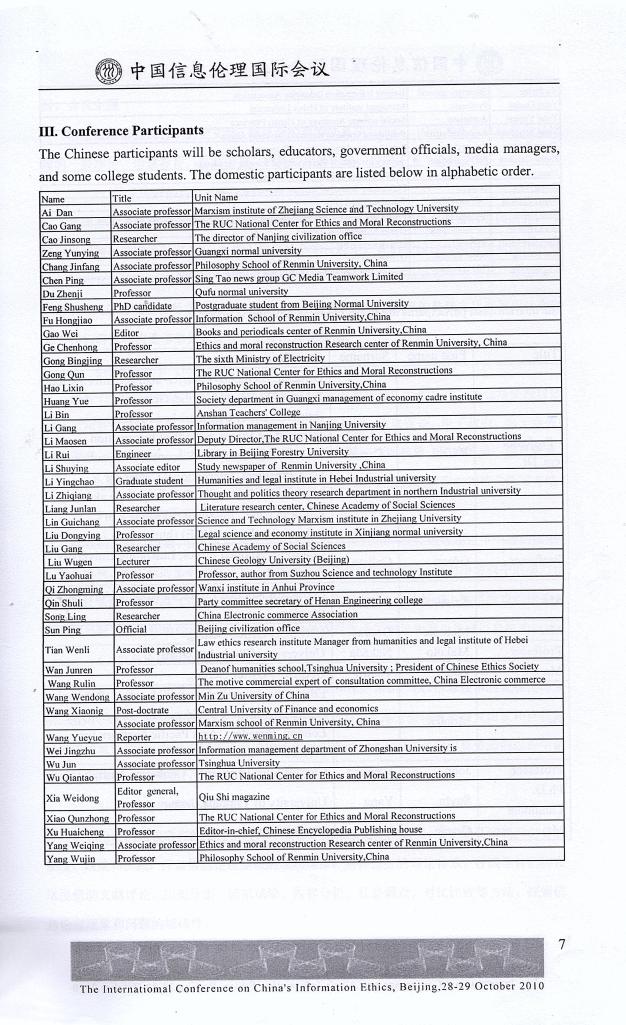 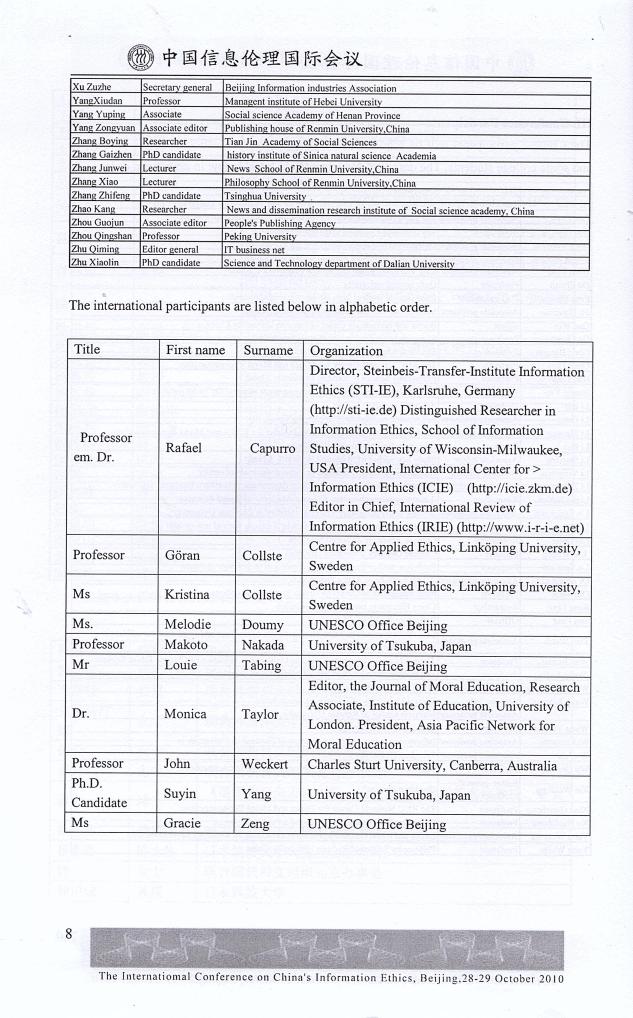 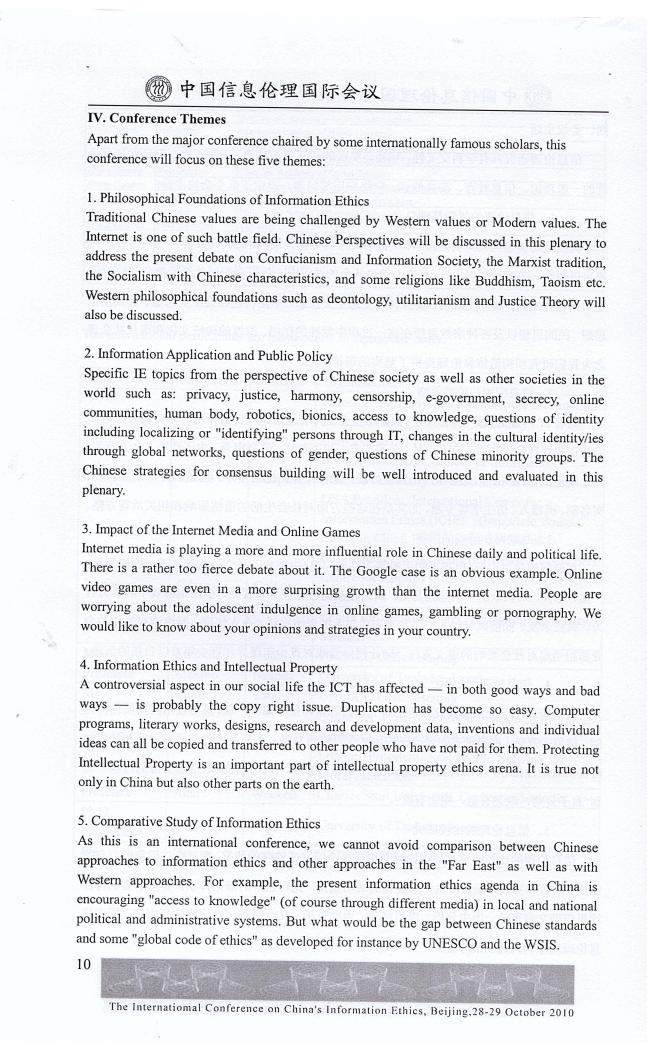 Keynote: The Dao of the Information Society in China and the Task of Intercultural Information Ethics (PowerPoint) Chinese translation of the whole paper by Junlan Liang (Chinese Academy of Social Sciences). 中国信息社会之"道"与互文化信息伦理 It was a very successful conference thanks to the commitment of Prof. LI Maosen and his team. Some 60 participants, professors and students, from different Chinese universities and institutions attended the conference as well non-chinese participants: Prof. Göran Collste and his wife Kristina (Linköping University, Sweden), Prof. Makoto Nakada (University of Tsukuba, Japan) PhD. Cand. Suyin Yang (University of Tsukuba, Japan), Prof. John Weckert (Canberra, Australia), Dr. Monica Taylor (UK, Asia Pacific Network for Moral Education), UNESCO Office Beijing (Ms. M. Doumy, Mr. L. Tabing, MsG. Zeng). The conference was supported by the Chinese Ministry of Education. Speeches at the opening ceremony by Prof. XU Weicheng (Editor in Chief, Chinese Encycl. Publ. House), Prof. XUE Huanbai (Vice-President of Renmin University), Prof. WAN Junren (Dean of Humanities School, Tsinghua University), and myself (on behalf of the ICIE). Keynotes from Prof. Makoto Nakada (University of Tsukuba, Japan) Prof. LU Yaohuai (Suzhou Science and Technology Institute), Prof. XU Zuzhe (Beijing Information Industry Association) and myself. Four group meetings with short presentations and open discussions dealing with:
The proceedings were distributed at the beginning of the conference and will be available on the internet. These are the authors and titles of the papers: 1. Rafael Capurro (International Center for Information Ethics): The Dao of the Information Society in China and the Task of Intercultural Information Ethics. 2. NN: Personal Health Monitoring Ethics. 3. Makoto Nakada (University of Tsukuba, Japan): Ba, roboethics and information ethics - blogs, privacy, robots in Japanese Ba or Seken which reflects traditional Asian culture(s) and ontological views in this world. 4.Gong Qun (Center for Ethics and Moral Reconstruction, School of Philosophy, Renmin University): Philosophical Reflection as to the Ethic of Network Information. 5. Chang Jinfang (School of Philosophy, Renmin University): From "the private" to "the citizen": The public trend of the subject of cyberspace. 6. Han Dongping, Zhu Jia (Department of Philosophy of Huzhong University of Science and Technology, Wuhan, Hubei): Cyberspace: anonymity or real name? 7.Huang donggui, Huang Hailian, Yang Ting (Political College of the Guangxi University, Nanning, Guangxi): Ethical thinking of network "human-powered search" phenomenon. 8. Huang Yue, Xin Yan (Guangxi Economic Management Cadre College): The concepts and methocs of innovative colleges in ideological and moral education in the field of internet vision - based on the survey on the university students' network life in Guangxi Economic Management Cadre College. 9.Shi Quipei, Liu Dongjing (Legal science and economy institute of Xinjiang Normal University): Studies on the network ethics caused by "manpower search". 10. Nie Jingang (School of Philosophy, Renmin University of China): Ethical Reflections on Citizen's Political Participation 11. Li Zhi-qiang, Liu Zhi-ping (The Research Institute for Intellectual Culture and Social Development, North China University of Technology, Beijing): An Analysis on the Research Situation and Prospect of Information Ethics Education in China. 12. Lü Yaohuai (Public Administration College, Suzhou Science and Technology Institute, Suzhou): On Information Ethics. 13. Zhang Yimu (School of Philosophy, Renmin University): On Ethical Intervention in Information Society. 14. Li Rui (Library of Beijing Forestry University): Ouline of the hot spot information ethics research. 15. Fan Hao: The World of Ethics under Electronic "Mode of Information". 16. Tian Wen-li, Li Ying-chao (School of Humanities and Law, Hebei University of Technology, Tianjin): Research on the Legalization Path of Information Ethics. 17. Zeng Yun-ying (Guanxi Normal University, Guilin): An Analysis on the Practical Effect and Equilibrium Stability of College Students's Shame Sense Education. 18. Li Maosen (School of Philosophy, Renmin University): Why do we accept international rules? 19. Nie Jinggang (School of Philosophy, Renmin University): Ethical Reflections on Citizen's Online Political Participation. 20. Wang Le (School of Philosophy, Renmin University): Doctrine of the mean -- Information Ethics should have this meaning. 21. Tian Wenli, Liu Fan (Hebei Technology University, Tianjin): The information of the universe noumenon and its ethics exploration - an ethical unscrambling of the information in the Bible. 22. Liu Guichang (Marxism School of the Zhe Jiang Sic-Tec University): Chinese traditional "Tsun Zi" and modern network ethics. 23. Zhu Xiaolin, Wang Gouyu (Humanity School of Da Lian Sci-Tec University): The Freedom and Privacy Issues in Ubiquitous Computing. 24. YANG, Suyin and NAKADA, Makoto (University of Tsukuba, Japan): Privacy in the Information Society. A Study on the Recognition of Privacy of the Internet Users in China. There was a lot of time for personal conversations and everybody enjoyed the wonderful Chinese meals. The Chinese Academy of Social Sciences (CASS) will create a network and an internet platform of Information Ethics in China See Prof. 刘钢 Liu Gang CHINESE MEDIA REPORTS
ABOUT THE
CONFERENCE
(broken links)
CHINESE TRANSLATIONS
Interpreting the Digital Human (2008). Chinese translation Alien blog, 2013 Intercultural Information Ethics. Chinese translation by Junlan Liang (Chinese Academy of Social Sciences) 2011 The Dao of the Information Society in China and the Task of Intercultural Information Ethics 2010. Chinese translation of the whole paper by Junlan Liang, Chinese Academy of Social Sciences. 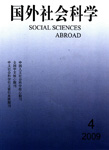 Towards an Ontological Foundation of Information Ethics in: Ethics & Information Technology, 8, 4, 2006, 175-186. Chinese translation in: Shanghai Shifan Daxue Xuebao 2006, 05, 24-35. 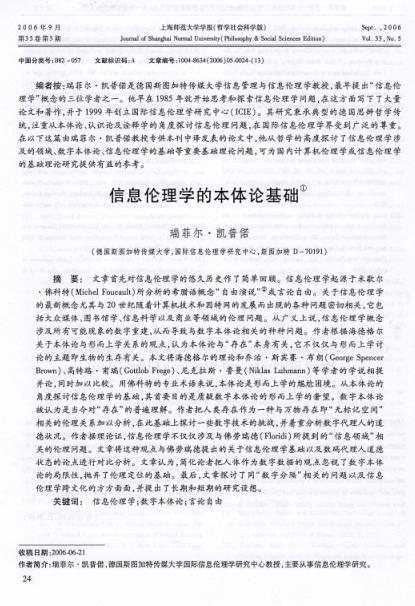 Selected Publications
最
新英文出版物
"Following the path of
thought
about considering the Dao as information, I sent an
email to Xueshan
Yan from the Department of Information Management,
Peking University,
— who could not take part of the ISIS conference but who is a member of FIS — asking him about the Chinese sign for information and its relation with breathing and information. He answered me as follows: "The expression of Information in Chinese is 信息(pronunciation: xin xi). 信 in ancient Chinese has the meaning of "say something by mouth", "letter"; in modern Chinese it means message (informal or small information); only 息 has the meaning of breathing both in ancient and modern Chinese. If separated 信 or 息 do not have any relationship with Dao. Only when they are combined together the meaning of Dao can emerge." (Xueshan Yan, e-mail from September 8, 2015) (Quote from p.8) Translating Information. Proceedings of the conference FIS/ISIS 2015: Information Society at the Crossroads, Response and Responsibility of the Sciences of Information, The Dao of the Information Society in China and the Task of Intercultural Information Ethics Renmin University, October 28-29, 2010 (PowerPoint) Go Glocal. Intercultural Comparison of Leadership Ethics 2007 Ethik der Informationsgesellschaft. Ein interkultureller Versuch 2006 MEMBERSHIPS
会员 Member of
the European Group on
Ethics in Science and New
Technologies
(EGE) to
the European
Commission 2000-2010 Senior
Fellow in Information Ethics, 2007-2008 /
2009-2010, Center
for
Information Policy Research,
Member
of
the Advisory Board of ID4Africa (since
2014) Senior
Fellow of the Graduate School of Humanities
and Social Sciences,
University of Tsukuba, Japan (since 2014) Research
Associate in the Department
of
Information Science, Faculty of
Engineering, Built Environment
and
Information Technology, University of Pretoria,
South Africa since 2017
BOOKS
NELSON
MANDELA  Homo
Digitalis. Beiträge zur Ontologie, Anthropologie
und Ethik der
digitalen Technik. Heidelberg:
Springer VS
2017. Rafael
Capurro, Michael
Eldred and Daniel
Nagel: Digital
Whoness: Identity, Privacy and Freedom in the
Cyberworld. Berlin: de Gruyter 2013.
(See: Internet-Privacy
Project)
Rafael
Capurro - John Holgate (eds.). Messages
and
Messengers. Angeletics as an Approach to the
Phenomenology of
Communication. Von Boten und Botschaften. Die
Angeletik als Weg zur
Phänomenologie der Kommunikation, Munich: Fink
2011.
Rafael Capurro and Michael Nagenborg
(Eds.): Ethics and Robotics. Heidelberg: Akademische
Verlagsgesellschaft 2009. 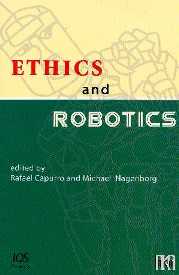
Rafael Capurro,
Johannes Frühbauer, Thomas
Hausmanninger (Eds.): Localizing
the
Internet. Ethical Aspects in Intercultural
Perspective.
Vol. 4, München: Fink 2007
Leben im Informationszeitalter. Berlin: Akademie Verlag 1995 Hermeneutik
der
Fachinformation. Freiburg/München: Alber
Verlag 1986. Information.
Ein Beitrag zur etymologischen und
ideengeschichtlichen Begründung
des Informationsbegriffs. München:: Saur 1978.
BOOK
SERIES 出版 书籍
Schriftenreihe Medienethik
(2002-2022). Stuttgart: Steiner JOURNALS
期刊 Founder
and
Editor- in-Chief (2004-2018) PROJECTS
EU
Project ETICA
(2009-2011) 教
学与研究领域 Information
Science 信息科学 Translators: 吴君 (Jun,
Wu) and 吕耀怀
( Lue, Yao Huai) Last
update: June 26 , 2023 |
| |
